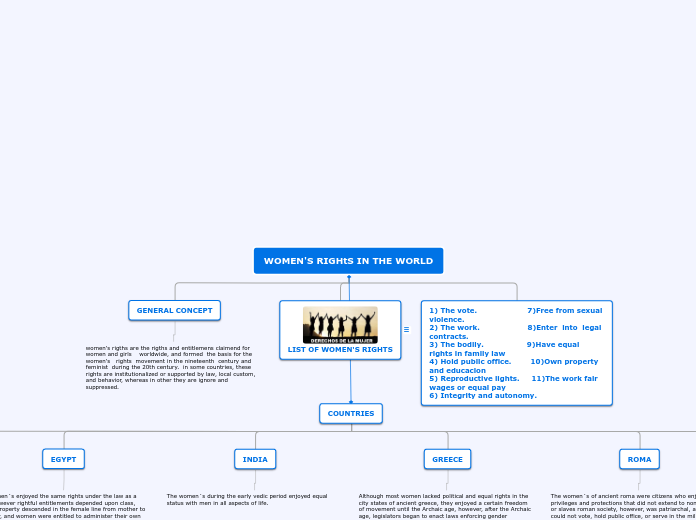WOMEN'S RIGHtS IN THE WORLD
GENERAL CONCEPT
women's rigths are the rigths and entitlemens claimend for women and girls worldwide, and formed the basis for the women's rights movement in the nineteenth century and feminist during the 20th century. in some countries, these rights are institutionalized or supported by law, local custom, and behavior, whereas in other they are ignore and suppressed.

LIST OF WOMEN'S RIGHTS
1) The vote. 7)Free from sexual violence. 2) The work. 8)Enter into legal contracts. 3) The bodily. 9)Have equal rights in family law 4) Hold public office. 10)Own property and educacion 5) Reproductive lights. 11)The work fair wages or equal pay 6) Integrity and autonomy.
COUNTRIES
MESOPOTAMIA
The women´s in ancient Sumer could buy, own,sell, and inherit property. they could engage in commerce, and testify in court as witnesses, amongst others.
EGYPT
The women´s enjoyed the same rights under the law as a men, however rightful entitlements depended upon class, landed property descended in the female line from mother to daugther, and women were entitled to administer their own property. women in ancient egypt could buy, sell, be a partner in legal contracs, be executor in wills and witness to legal documents, bring court action, and adopt children.
INDIA
The women´s during the early vedic period enjoyed equal status with men in all aspects of life.
GREECE
Although most women lacked political and equal rights in the city states of ancient greece, they enjoyed a certain freedom of movement until the Archaic age, however, after the Archaic age, legislators began to enact laws enforcing gender segregation, resulting in decreased rights for women.
ROMA
The women´s of ancient roma were citizens who enjoyed legal privileges and protections that did not extend to non- citizens or slaves roman society, however, was patriarchal, and women could not vote, hold public office, or serve in the military women of the upper classes exercised political influece through marriage and motherhood.
CHINA
The women´s throughout historical and ancient china were considered inferior and had subordinate legal status based on the confucian law.
